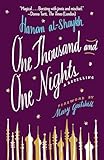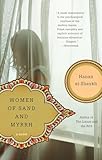Dig deep enough into frivolity, and you just might strike substance. Sound far-fetched? Well, it is. After all, if we’re talking about books, most of the time you’ll come up empty-handed; what appears frivolous at first blush tends to be precisely that upon closer inspection. But with a combination of inexhaustible patience, superior burrowing technique, and plain old-fashioned luck, chances are that one day you’ll end up with one that fits the bill. As it happens, The Occasional Virgin, by Hanan al-Shaykh, is that book—this reviewer did the requisite digging for you—or at least one of the precious few in circulation.
Al-Shaykh is a Lebanese novelist and short story writer, long resident in London, who writes in Arabic. (That said, her recent One Thousand and One Nights: A Retelling was written in English.) Because of her years in the U.K. and her frank discussion of sexual matters in fiction often set in Arab countries—see, for example, The Story of Zahra and Women of Sand and Myrrh—al-Shaykh has had to contend with charges that she has divorced herself from the Arab world she continues to mine for stories and that her depiction of Arab women smacks of Orientalism. Such overblown accusations need not detain us here. In fact, an intriguing (and counterintuitive) aspect of The Occasional Virgin is that al-Shaykh has dulled the edge of much of her original Arabic-language material. This process appears to have begun with the book’s very title.

 The Occasional Virgin is not a straightforward translation of an original Arabic-language work but an adaptation of two of the author’s books, an anemic novella titled Two Women by the Sea and the outwardly silly novel [The] Virgins of Londonistan, which feature the same pair of protagonists. Al-Shaykh merged the two stories, reworking, excising, and adding much material. The resulting text was then rendered into fluid and natural-sounding English by Catherine Cobham, who is not only a veteran translator but head of the Department of Arabic and Persian at the University of St. Andrews in Scotland.
The Occasional Virgin is not a straightforward translation of an original Arabic-language work but an adaptation of two of the author’s books, an anemic novella titled Two Women by the Sea and the outwardly silly novel [The] Virgins of Londonistan, which feature the same pair of protagonists. Al-Shaykh merged the two stories, reworking, excising, and adding much material. The resulting text was then rendered into fluid and natural-sounding English by Catherine Cobham, who is not only a veteran translator but head of the Department of Arabic and Persian at the University of St. Andrews in Scotland.

 Al-Shaykh knew full well that to effect a successful amalgamation of Two Women and Londonistan, the latter would have to swallow the former. Not just because it’s broader in scope and more consequential but because any variation on its title would prove catchier than something about a couple of women on a beach. Yet she dropped “Londonistan”—almost certainly because the term, a barb directed at the supposed cultural Islamization of London, would offend North American and British readers (who have been exposed to alarmist books such as Melanie Phillips’s Londonistan) far more than it did Arabs.
Al-Shaykh knew full well that to effect a successful amalgamation of Two Women and Londonistan, the latter would have to swallow the former. Not just because it’s broader in scope and more consequential but because any variation on its title would prove catchier than something about a couple of women on a beach. Yet she dropped “Londonistan”—almost certainly because the term, a barb directed at the supposed cultural Islamization of London, would offend North American and British readers (who have been exposed to alarmist books such as Melanie Phillips’s Londonistan) far more than it did Arabs.
But let’s not get ahead of ourselves. What is The Occasional Virgin all about? Well, related by a third-person narrator equally comfortable inhabiting the mind of either of al-Shaykh’s 30-something protagonists, it’s a two-part story, with Part I adapted largely from Two Women, and Part II a reworked version of Londonistan. Following little of note in Part I, which is set on the Italian Riviera (but includes flashbacks to Lebanon), we meet up again with the pair in the U.K.’s capital a few months later. That’s where Yvonne, who owns and manages an advertising firm, lives; Huda, a Toronto-based theater director—who’s gathering information on whether she might stage a performance of One Thousand and One Nights in London—is visiting her. Al-Shaykh has them stroll through Hyde Park, where they pause to listen to the assortment of zealots haranguing people at Speakers’ Corner. What happens next sets the story in motion.
Huda, whose late father was an imam, can be described as lying somewhere between agnosticism and atheism. (Yvonne, born into a Christian family, isn’t much for organized religion either, but—as becomes apparent later—retains her childhood veneration of the Virgin Mary.) Nevertheless, when brought face-to-face with Islam-bashers at Speakers’ Corner, Huda pushes back. For example, referring to the Prophet Muhammad, she insists that “God’s messenger is the one who ordered the emancipation of slaves and made them free and forbade racism.”
As though Huda taking on the task of defending Islam weren’t ironic enough, al-Shaykh shrewdly finds a way to turn this encounter into—of all things—a confrontation between the spirited woman and a handsome but hectoring Muslim. While she’s at it, the author even manages to work in a dig at Islam itself.
It starts with a young man’s insistence that Huda, while fully engaged in singing Islam’s praises to the assembled crowd, should take care to employ specific and mandatory terms of reverence when citing the Quran or the Prophet Muhammad. As he is insufferable, and as Huda doesn’t take kindly to his schoolmarmish ways, she doesn’t oblige. Matters escalate, and before long the guy, an Algerian-Egyptian named Hisham with whom she converses in Arabic, issues a bloodcurdling threat: “Do you know that hens are slaughtered if they cry like roosters?”
What enrages Hisham so is Huda’s bemoaning of the fact that certain majority Muslim countries permit marriage between adult males and girls, “some of them as young as eight.” Left unsaid is that the Prophet Muhammad’s marriage to Aisha when she was of a similar age has long served as the justification for such laws. Hisham, of course, knows as much.
Soon afterward, the two women take their leave. Yet Huda is still incensed—and vengeful. Here, at long last (we’re almost halfway through the novel), the first stirrings of an enduring and much-needed conflict are felt. The remainder of The Occasional Virgin can be neatly divided into two sections (though the author enacts no such division): The first concerns Huda’s efforts to get the better of Hisham, and the second sees al-Shaykh shift her attention to the lovelorn Yvonne, who receives mixed signals from a man she takes a shine to at a wedding party, and later must decide how exactly to handle the bewildered Hisham when he starts dropping in at her office and then her home in a bid to determine the whereabouts of a now-vanished Huda.
Yvonne’s experiences, both at the wedding party and with Hisham, are nothing special and not worth lingering on. It’s Huda’s earlier encounter with Hisham that provides spark. Igniting that spark is the fact that Huda, far from behaving like the proverbial rooster this time around, uses her feminine wiles to strike back at her antagonist. Having heard Hisham say something about planning to attend a demonstration in front of the Syrian embassy that afternoon in order to protest the Syrian regime’s violence against its people, Huda, without yet having worked out a plan, resolves to waylay him there. Meanwhile, as a lark back at her house, Yvonne introduces her friend to something called a “strawberry” by its manufacturers. This, Huda realizes, is what she must use to catch her holier-than-thou bête noire in a compromising position.
The “strawberry” in question is what a sexually active woman intent on appearing virginal inserts into her vagina to trigger the flow of “blood” upon intercourse. So when Huda, having homed in on her quarry at the demonstration and convinced him that she’s feeling ill, manages to get him to take her to his home, the stage is set for both a rounding out of Hisham’s hitherto one-dimensional character (a university student working as a doorman, he proves quite considerate and helpful) and the actualization of her ruse.
Huda doesn’t have to exert much effort to seduce the excitable Hisham—though he catches her off guard by proposing an on-the-spot marriage. All they must do for it to pass Islamic muster, he maintains, is recite a verbal formula. After a brief hesitation, Huda accepts. The next step is for the two to consummate the union. That, after all, is the reason Hisham proposed to her in the first place. Meanwhile, Huda hopes things turn out thus:
He sleeps with her, discovers she’s a virgin and regrets calling her names and treating her so hatefully, is maybe even sorry that he tried to shut her up, subdue her, sorry for believing that every Muslim woman who didn’t cover herself was a fallen woman with no place in society.
As for the thorny matter of sex, Huda has girded herself. “All I’m going to think about,” she muses, “is the strawberry waiting to explode, and the satisfaction of having my revenge on him when he sees my virginal blood and his arrogance and self-righteousness melt away.”
Before we get to that exploding strawberry, let’s touch on another subject having to do with sex that crops up between the two newlyweds round about this time—at least in Londonistan. At one point, Huda informs Hisham that Muslim martyrs looking to spend eternity having sex with dozens of houris, the beautiful and perpetual virgins of paradise, will be sorely disappointed. According to Huda, there exists a consensus among Arab scholars of the Arabic language that the plural term houris (in Arabic, “hour,” classically rendered in full as “hour ‘ayn”) refers to grapes.
Here’s the problem: This assertion was made by the pseudonymous scholar Christoph Luxenberg in a German-language book, one that has—even after being translated into several languages—hardly caught on with Arab linguists or Islamic jurists. Moreover, Luxenberg’s fascinating claim is that the term is Syriac, and that the Quran, which Muslims hold to be a God-given Arabic-language original text, cannot be understood without taking into account the Syriac roots of much of its then-newfangled terminology. Huda doesn’t go anywhere near this explosive issue. But why did al-Shaykh have her claim, falsely, that it is Arab scholars of the Arabic-language, as opposed to Luxenberg, who assert that the houris are grapes? Ignorance? Wishful thinking? Or, most intriguingly, an indirect attempt to stimulate further discussion among Arabs and Muslims of the taboo subject that is the historical origins of the Quran?
Also, why is this whole exchange regarding houris and grapes missing from The Occasional Virgin? Unclear. Jumping back into the sack with Huda and Hisham, however, we discover that it isn’t the only thing that’s missing. Who would have thought that the English-language adaptation of two Arabic-language works of fiction would include less sex than the originals? In Londonistan, a priapic Hisham prevails upon Huda to have intercourse with him no fewer than four times within five hours of their “marriage.” In The Occasional Virgin, however, al-Shaykh has them sleep together just once.
The result isn’t simply a tamer encounter. Al-Shaykh changes the very nature of Huda’s enterprise. In Londonistan, Huda seems to wing it; yes, she aims to seduce Hisham and have him pop her strawberry, but it isn’t initially clear to the reader (and possibly to Huda herself) how she plans to use the guy’s subsequent shock to her advantage. What she comes up with is nothing short of a masterstroke. Huda makes use of a strawberry each and every time she has sex with Hisham, who can’t for the life of him understand why she keeps bleeding anew. He deflowered her the first time, and she’s not menstruating, so what’s going on?
Huda lets him stew in his uncertainty until the fourth time, when she confronts the befuddled sod with the purposely outlandish theory that she is in fact a houri. Though she ends up interpreting her supposed newfound status in different and contradictory ways, one proves especially provocative; she suggests that the virgins of paradise can no longer cope with the number of martyrs streaming through the pearly gates, so God has dispatched some of them to earth, where they might satisfy Muslim men who have yet to turn militant, let alone die.
This is all absent from The Occasional Virgin, if not simply because Huda and Hisham have themselves a tumble only once. Whereas their repeated lovemaking in Londonistan provides the perpetually virginal Huda with an opportunity to ask Hisham why people believe in miracles that took place long ago but doubt those (such as her hymen reconstructing itself) that happen before their very eyes, and to imply that carnal bliss is attainable here on earth and doesn’t require martyrdom, The Occasional Virgin proves considerably less revolutionary. True, Huda has formulated more of a plan to begin with. And yes, thanks to her use of the infamous strawberry, she gains the sought-after advantage over Hisham. But because there’s no more sex, she is unable to milk it. She must content herself with berating him for having considered her promiscuous on account of her attire, manner of speech, and style of comportment.
Yet there is admittedly one aspect of al-Shaykh’s paring down of the sexual element that emerges as more effective: Hisham’s crisis of conscience regarding their sham marriage, which in both versions of the story he decides he wants to turn into a legitimate union—replete with witnesses—posthaste. Because Hisham’s mistaken belief that he took Huda’s maidenhead is what prompts this sudden overriding concern (more on the reason for his anxiety shortly), it makes better sense that it should seize hold of him following a single roll in the hay, which is of course the case in The Occasional Virgin, as opposed to only after the activity’s fourth iteration.
At any rate, what’s the upshot of all this, you ask? Though lacking the slyly subversive quality of Londonistan, does The Occasional Virgin leave the reader with anything to think about?
It does. In our day and age, the notion that a never-married woman’s virtue derives from her virginity enjoys a good deal less currency than it once did. But it hasn’t gone bankrupt just yet. How to deal with those (not all of whom are named Muhammad, Ali, or Hisham) for whom it retains value? Al-Shaykh chooses humor—including oblique mockery. It’s all rather mild (again, the Arabic-language Londonistan is spicier), but it’s what makes The Occasional Virgin more than occasionally clever. A good thing, too, because the rest of the novel is superficial and boring.
Huda is arguably at her least virtuous when pretending that intercourse with Hisham marks her initiation into sex. Hisham, of course, falls for the deception. But that’s not the half of it. All of a sudden, his opinion of Huda undergoes a radical transformation. Indeed, he comes to behold her with a kind of reverence and is consumed with guilt. He even resolves to retroactively make their sham marriage official, though it’s clear that they have no future together and that, if they do marry, divorce would constitute the next logical step.
The reason for Hisham’s agitated state is simple. The guy is wrongly convinced that until he slept with the intelligent, accomplished, and attractive woman in question, she was a virgin. Why does this matter? Because it means that, despite Huda’s lackluster approach to Islam, she is still in some visceral sense loath to disregard certain of its strictures. “When I discovered that you’d preserved your virginity up till then,” explains a chastened Hisham, “I was sure you’d held fast to your religion without being conscious of it.” This in turn endears her to God. And as has by now become readily apparent, Hisham—obsessed as he is with being an observant Muslim bound for heaven—is desperate to remain in God’s good graces!









